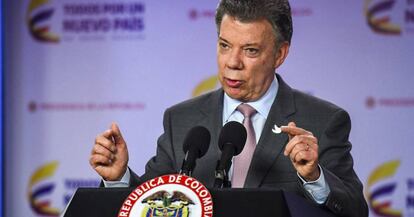Colombian president announces extension for ceasefire to October 31
Juan Manuel Santos hoping to pile pressure on opponents of peace deal with FARC

Colombian President Juan Manuel Santos announced on Tuesday that a ceasefire between government forces and the Revolutionary Armed Forces of Colombia (FARC) would only be extended until October 31.
The statement from Santos came two days after Colombian voters narrowly rejected a peace deal that promised to bring 52 years of conflict to an end – a shock result that has plunged the country into a deep political crisis.
Critically, it also came after Santos had previously assured Colombians a ceasefire would remain in place even after victory for the ‘no’ vote in Sunday’s plebiscite.
FARC leader Rodrigo Londoño, alias ‘Timochenko,’ responded via Twitter, asking: “From then on, the war continues?”
"@JuanManSantos anuncia que el cese al Fuego con las @FARC_EPueblo va hasta el 31 de octubre" ¿De ahí para adelante continúa la guerra?
— Rodrigo Londoño (@TimoComunes) October 5, 2016
That tweet was followed by an even more worrying message from Pastor Alape, a member of FARC’s secretariat. “We should move all of our units to more secure positions to avoid confrontations,” the official wrote.
Meanwhile, other FARC members sent messages affirming they were going to carry out protests on Wednesday aimed at defending a peace deal that had been four years in the making, and which supporters worry now may end up on the scrap heap.
After the statement by Santos, the country’s Defense Ministry and the president’s office rushed to downplay the leader’s announcement noting that the country’s constitution barred Santos from extending a ceasefire that was a feature of the peace deal rejected by the people of Colombia.
Time is very important: we are in a grey zone. A dangerous and risky limbo Colombian President Juan Manuel Santos
There is little doubt, however, that Santos’s message was also a direct challenge to former Colombian president Álvaro Uribe, the public face of the ‘no’ campaign in the lead-up to Sunday’s plebiscite, and other key opponents of the peace deal with the FARC.
“Let’s hope we have proposals as soon as possible. Time is very important: we are in a grey zone. A dangerous and risky limbo,” said Santos.
However, neither Uribe, who was the president of Colombia from 2002 to 2010, nor FARC have made their positions clear in the wake of Sunday’s vote, with Santos – now in damage-control mode – having to do the legwork.
Uribe, whose referendum campaign was marked by fearmongering over the dangers of allowing FARC to join the country’s political mainstream, has now toned down his message. This has seen him insisting Colombia must avoid a return to war without offering any concrete proposals.
It is clear, however, that the positions of Uribe and FARC could not be more different. The guerrilla group argues the result of the plebiscite shows that Colombia has a political problem, and the country is deeply divided. The group’s leaders have also used social media to argue that the peace deal doesn’t need reworking. The text, those leaders say, has already been deposited with the Swiss Federal Council and is therefore legally binding.
In other words, FARC are suggesting the result of Sunday’s vote is irrelevant.
But Uribe, currently a senator in the Colombian parliament, sees the problem as both a judicial and a political one. “We haven’t opened this battle front for trivial reasons, we have deep convictions,” the former president said on Monday.
Uribe has made it clear that he has no intention of initiating a new peace process with FARC. Instead he wants to make changes to the existing deal, although he has ruled out any direct participation in talks with the leftist rebels.
By announcing an end to the ceasefire Santos is directly challenging former Colombian president Álvaro Uribe, a key opponent of the country's peace deal
Speaking on Monday, Uribe proposed a possible amnesty for FARC soldiers and insisted they needed “effective protection” in the interests of preventing violence. Both of those suggestions are, however, already included in the 297-page deal signed by the government and the guerrilla group.
During the lead-up to the referendum, Uribe repeatedly stressed what he and many Colombians saw as a major flaw in the peace accord – the fact that it would allow members of the guerrilla group to enter mainstream politics and that FARC members would not be imprisoned if they recognized they had committed crimes.
Santos is due to meet with Uribe and Andrés Pastrana Arango, another former president who opposed the peace deal, on Wednesday. No FARC representatives will be present at that meeting.
English version by George Mills.
Tu suscripción se está usando en otro dispositivo
¿Quieres añadir otro usuario a tu suscripción?
Si continúas leyendo en este dispositivo, no se podrá leer en el otro.
FlechaTu suscripción se está usando en otro dispositivo y solo puedes acceder a EL PAÍS desde un dispositivo a la vez.
Si quieres compartir tu cuenta, cambia tu suscripción a la modalidad Premium, así podrás añadir otro usuario. Cada uno accederá con su propia cuenta de email, lo que os permitirá personalizar vuestra experiencia en EL PAÍS.
¿Tienes una suscripción de empresa? Accede aquí para contratar más cuentas.
En el caso de no saber quién está usando tu cuenta, te recomendamos cambiar tu contraseña aquí.
Si decides continuar compartiendo tu cuenta, este mensaje se mostrará en tu dispositivo y en el de la otra persona que está usando tu cuenta de forma indefinida, afectando a tu experiencia de lectura. Puedes consultar aquí los términos y condiciones de la suscripción digital.









































